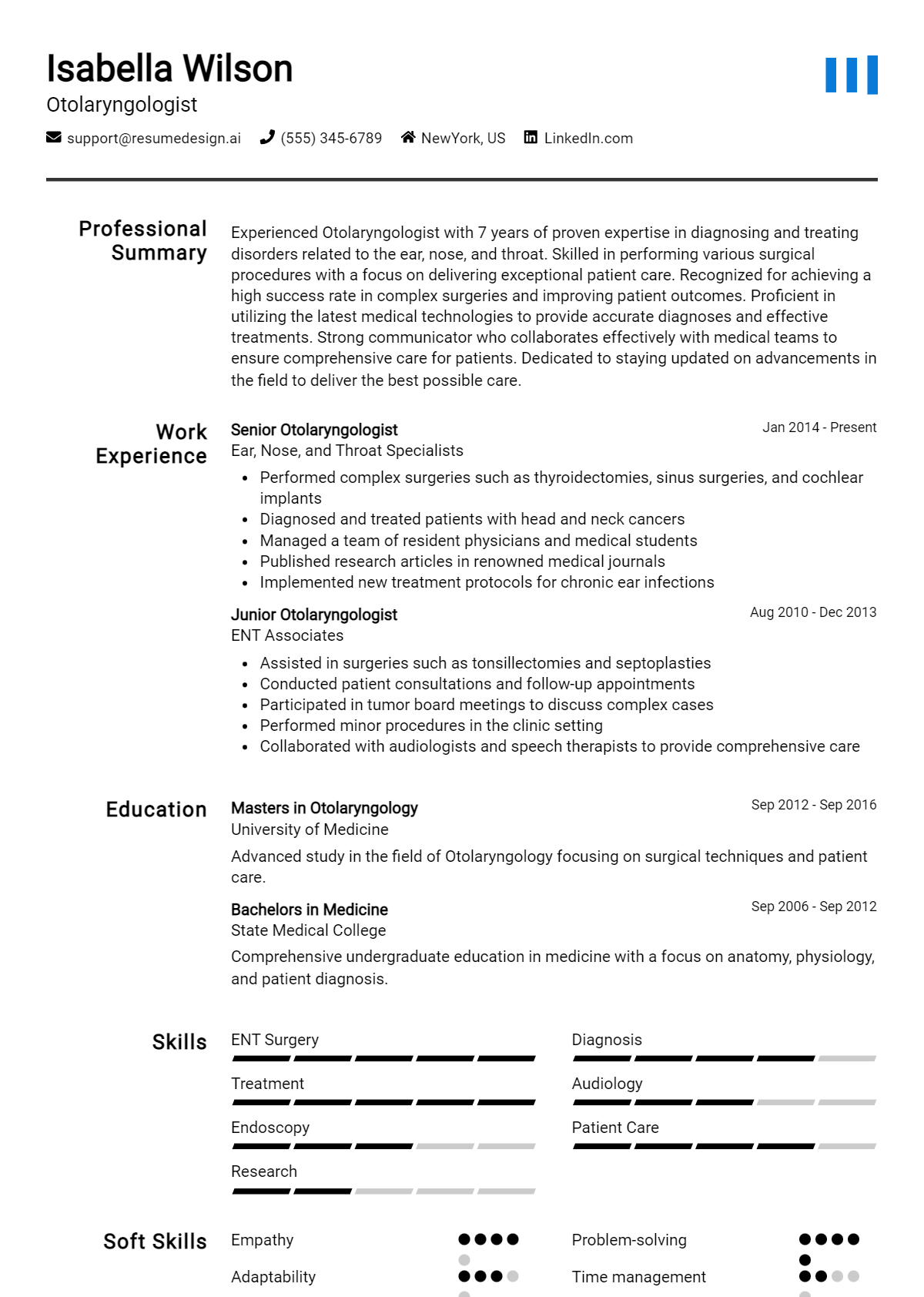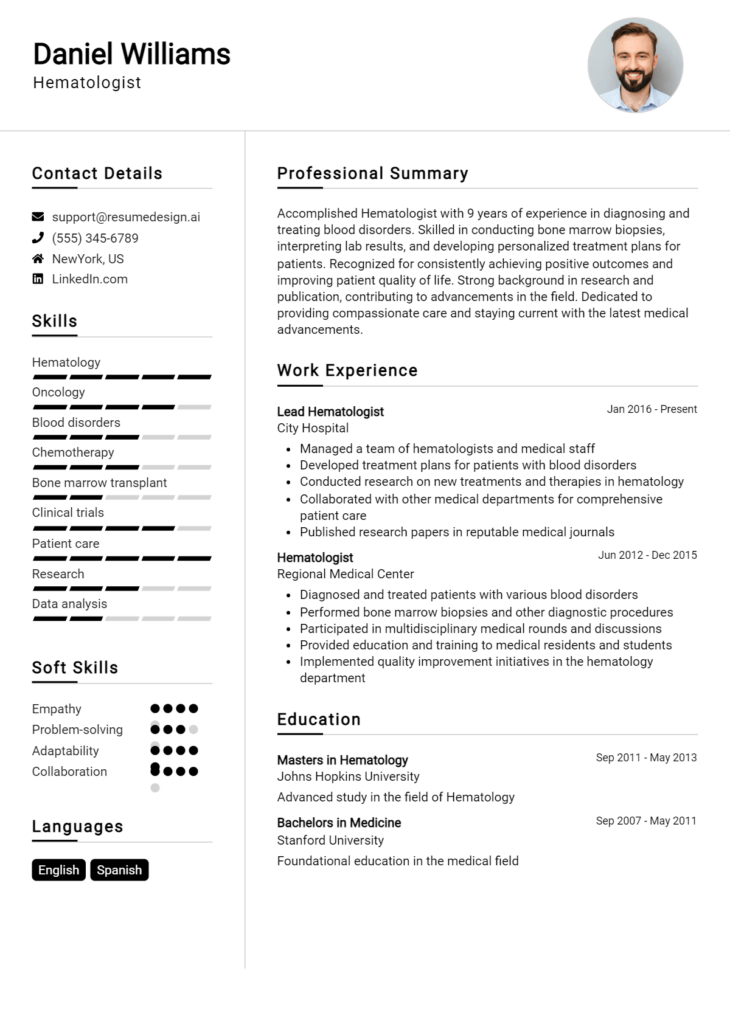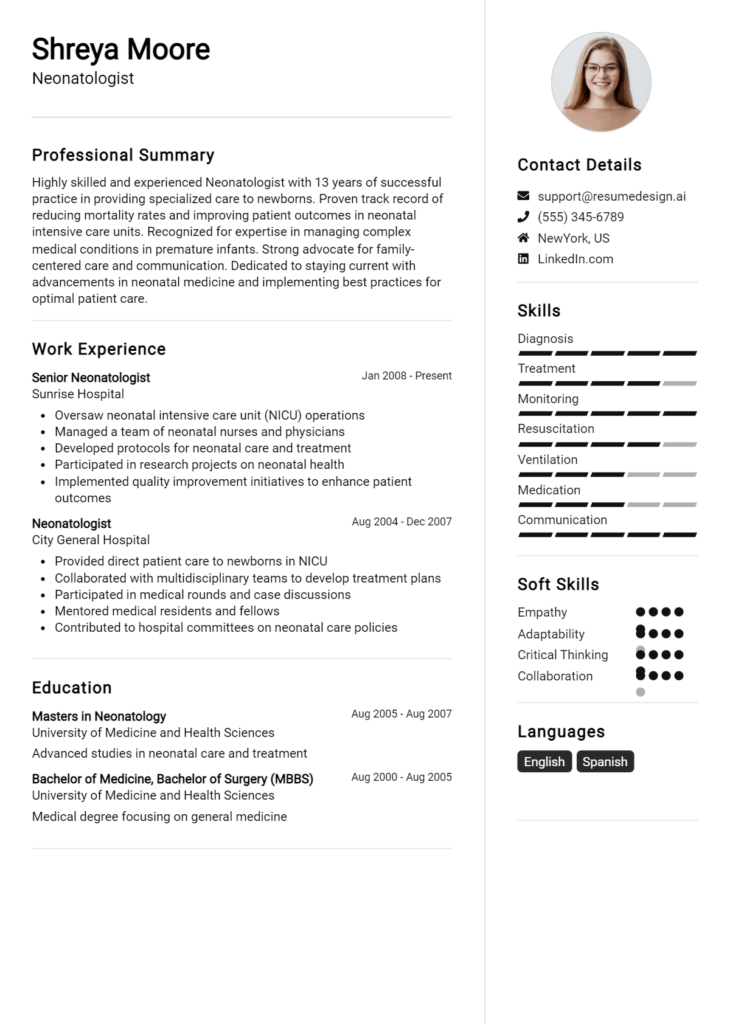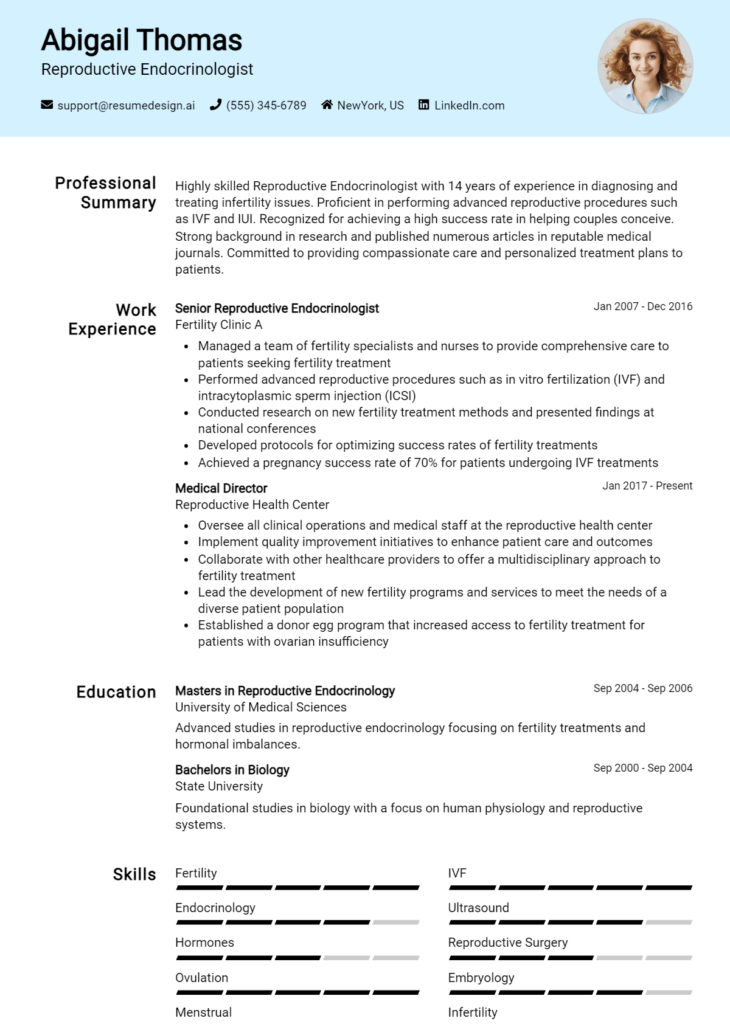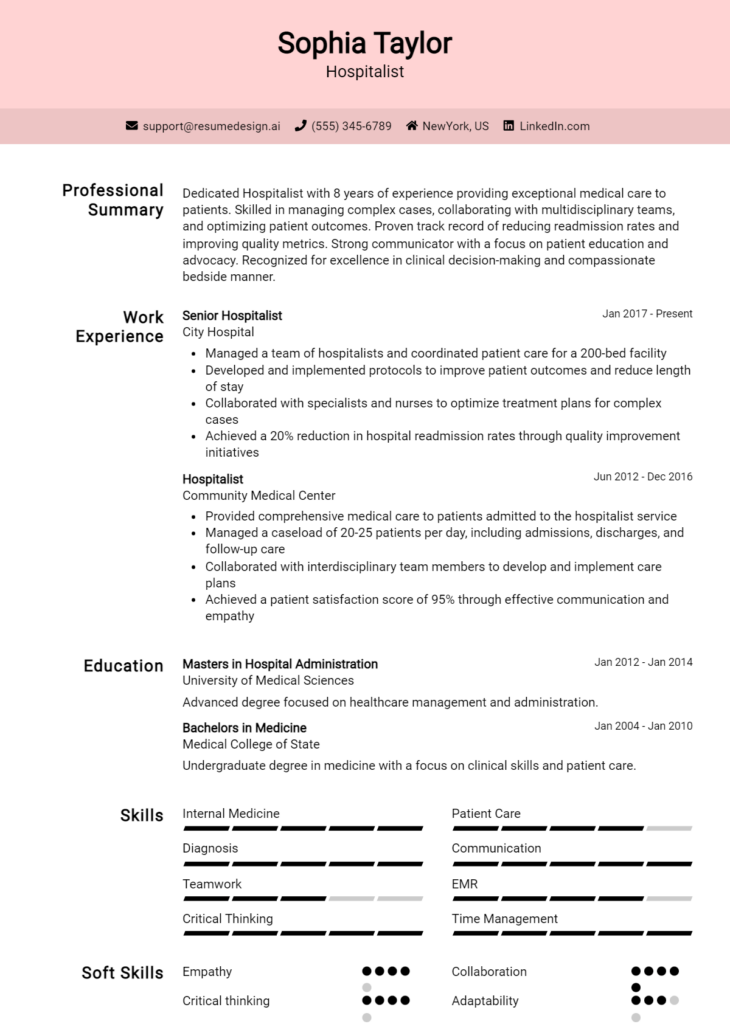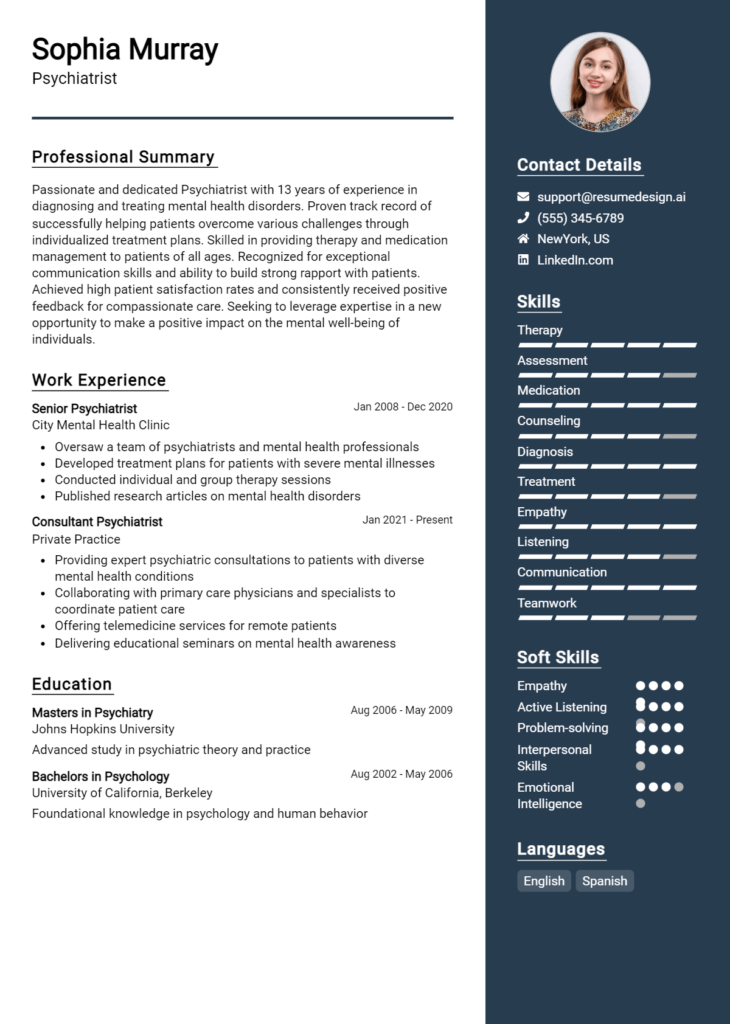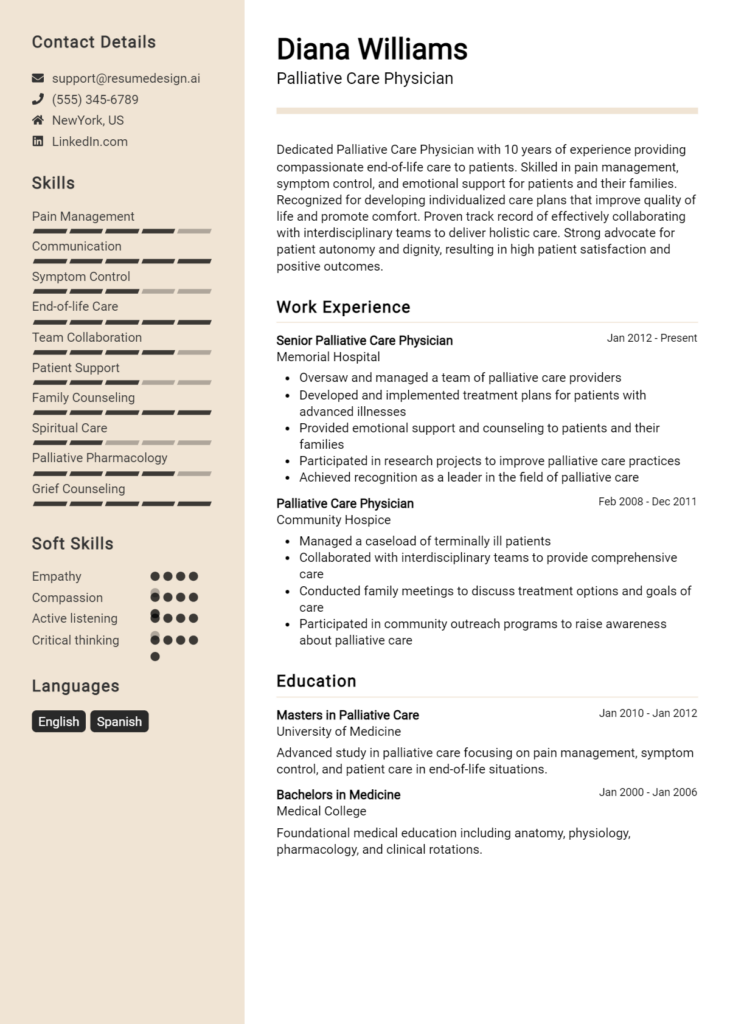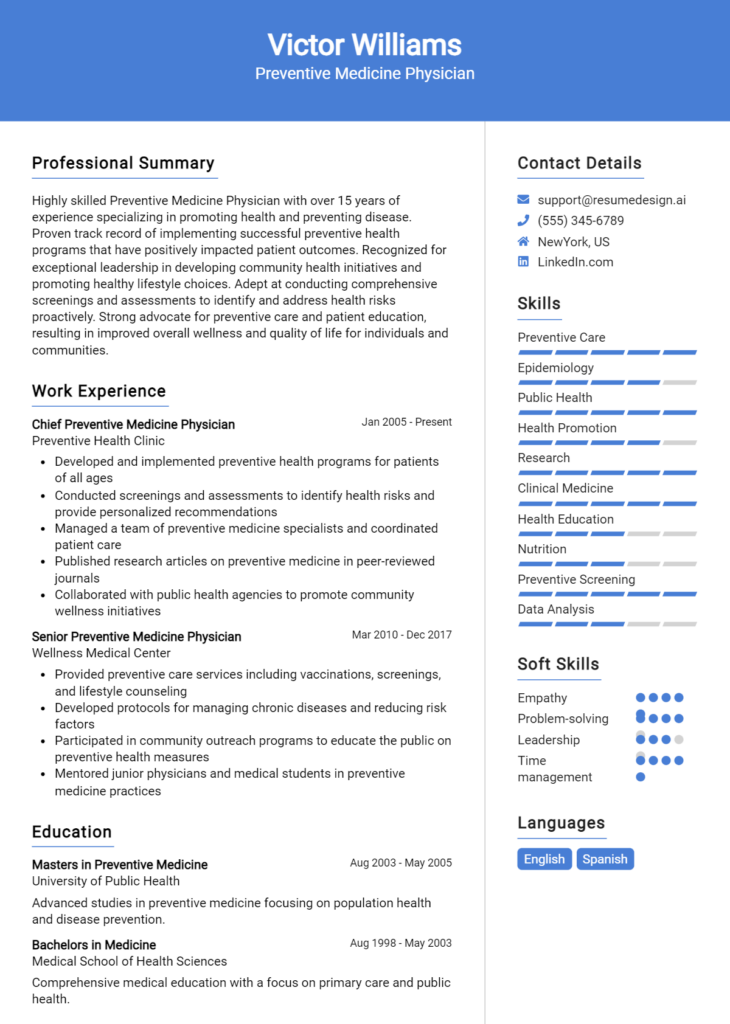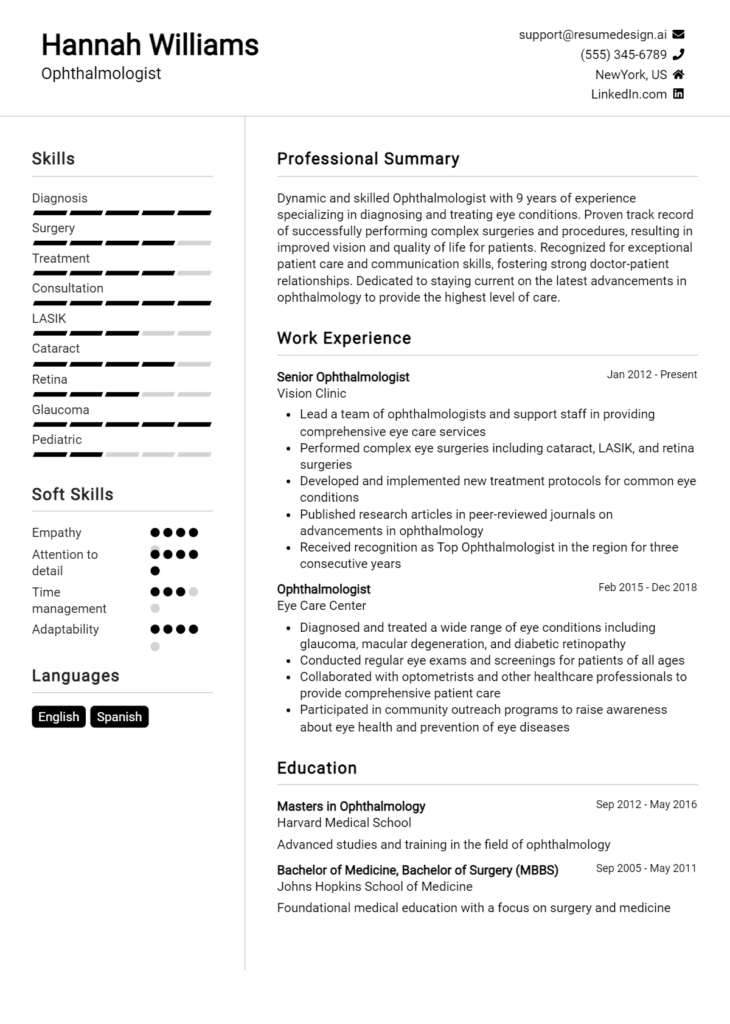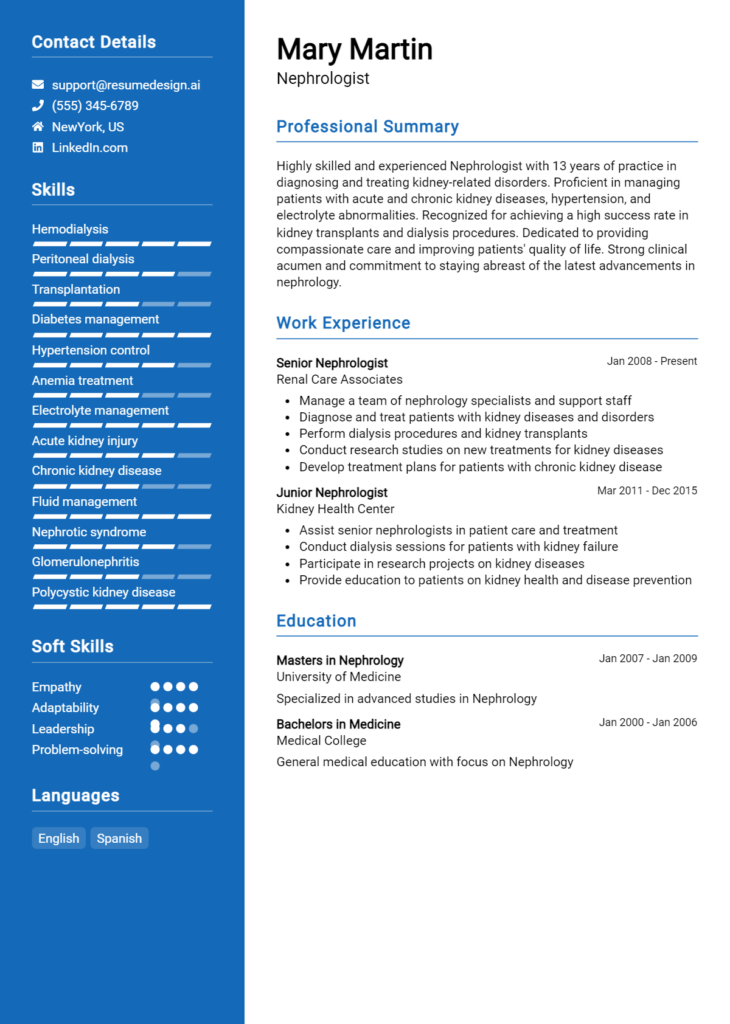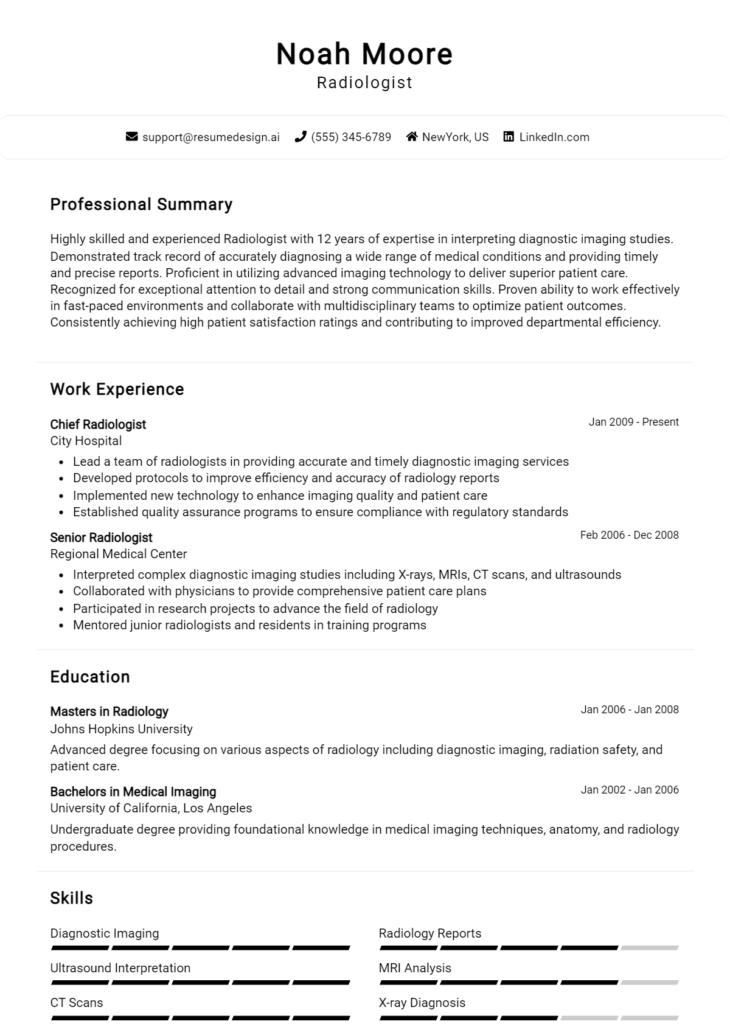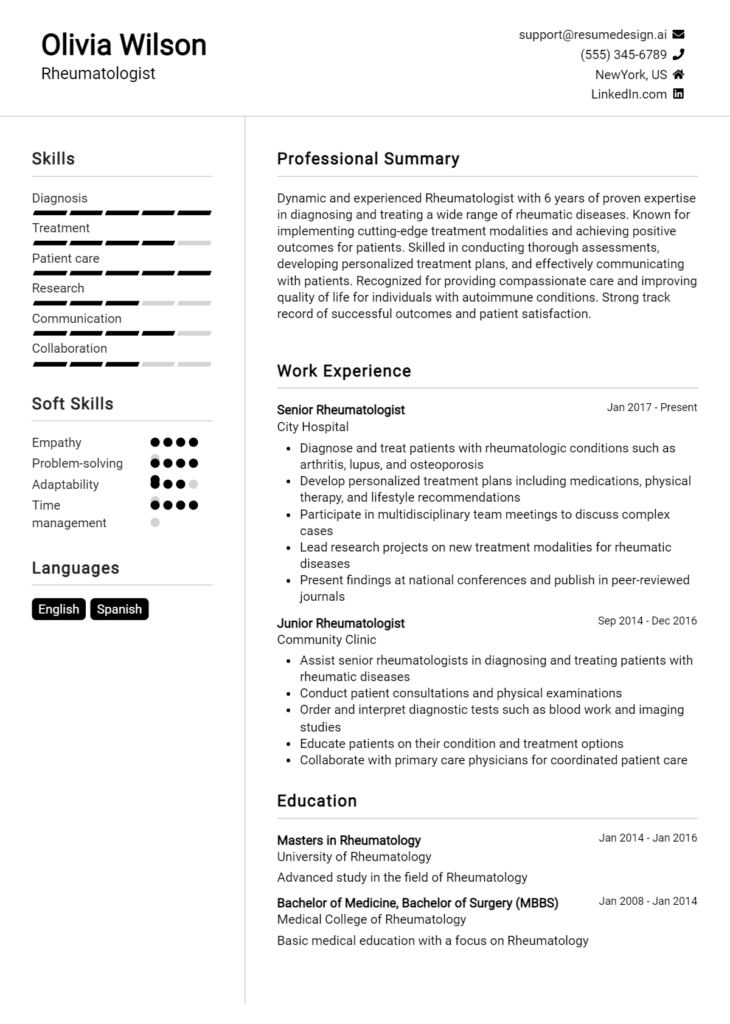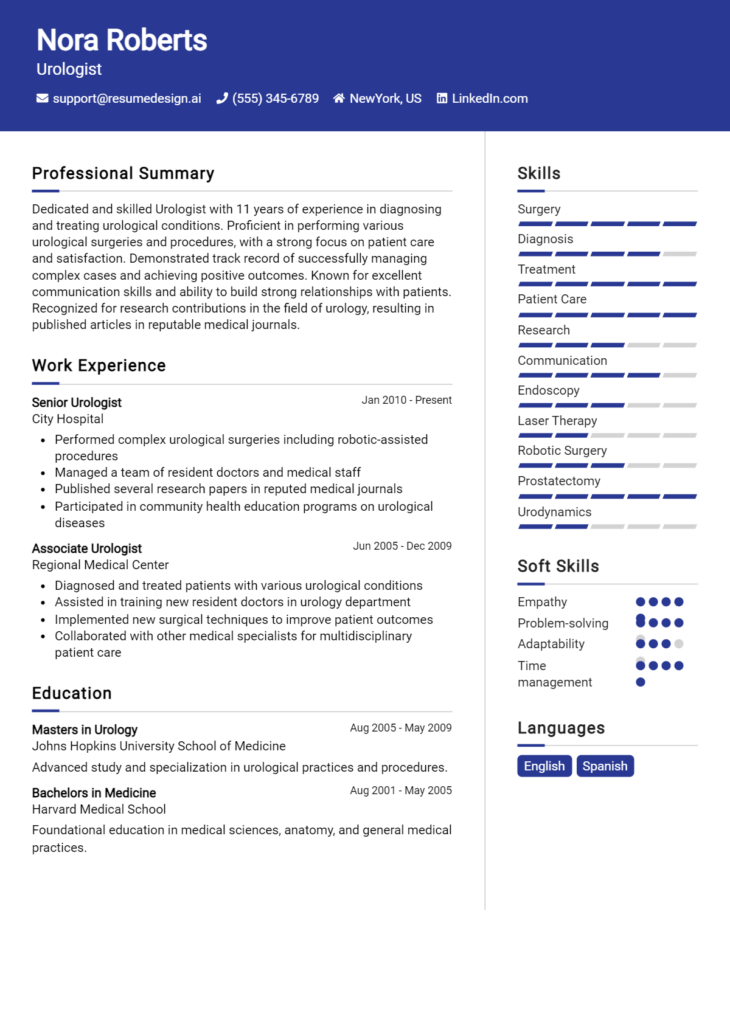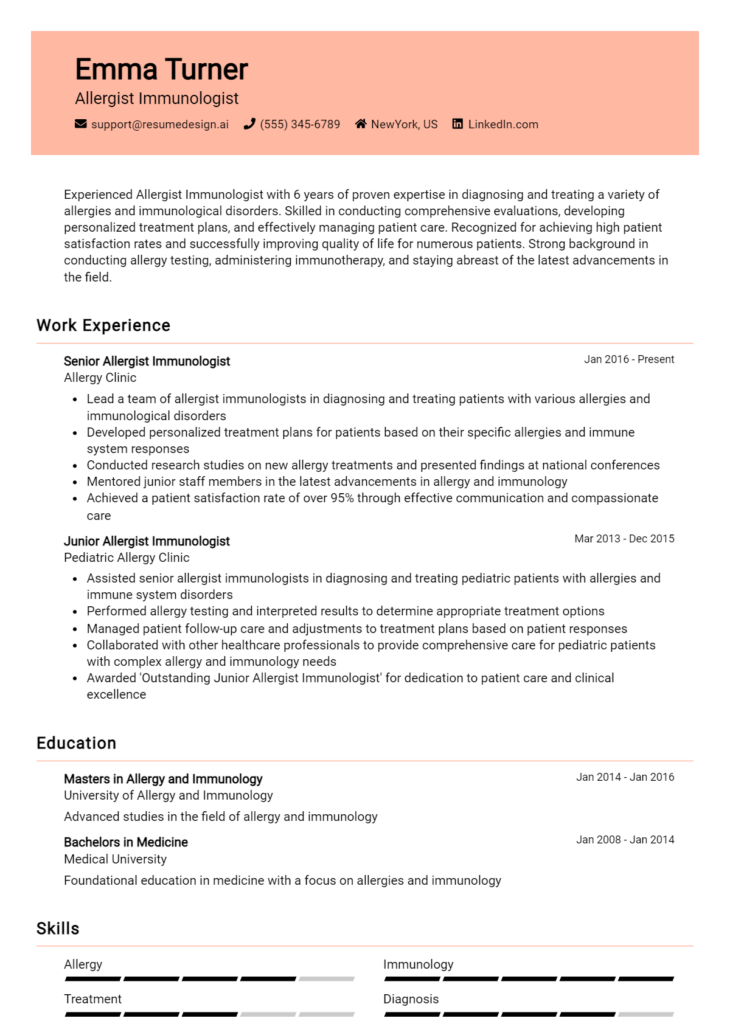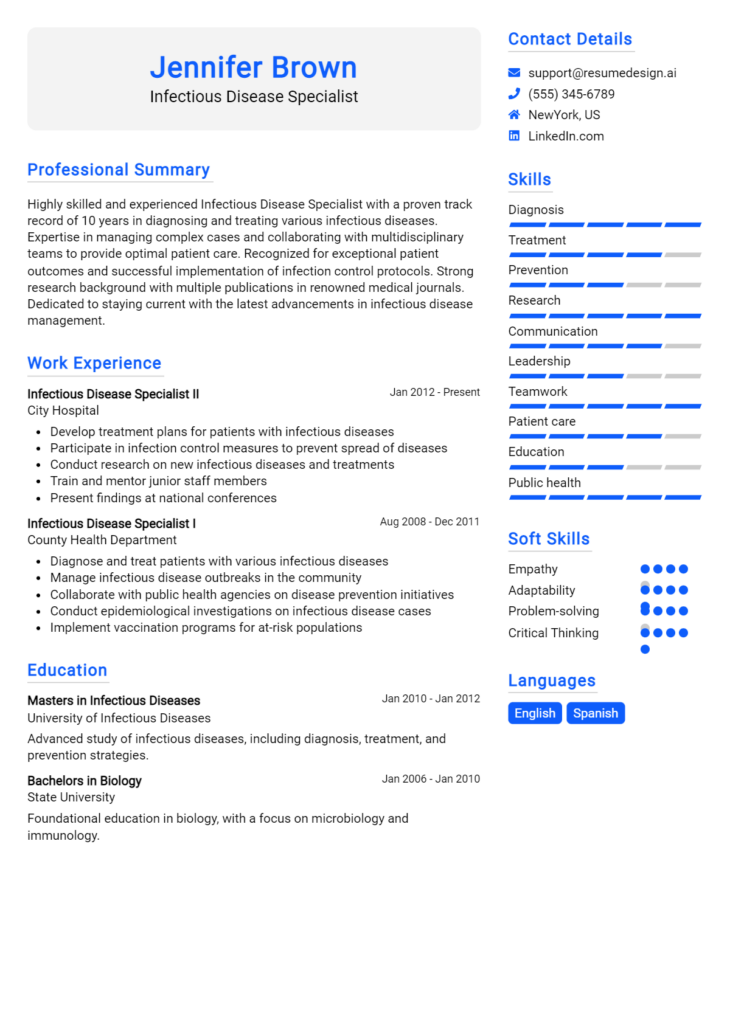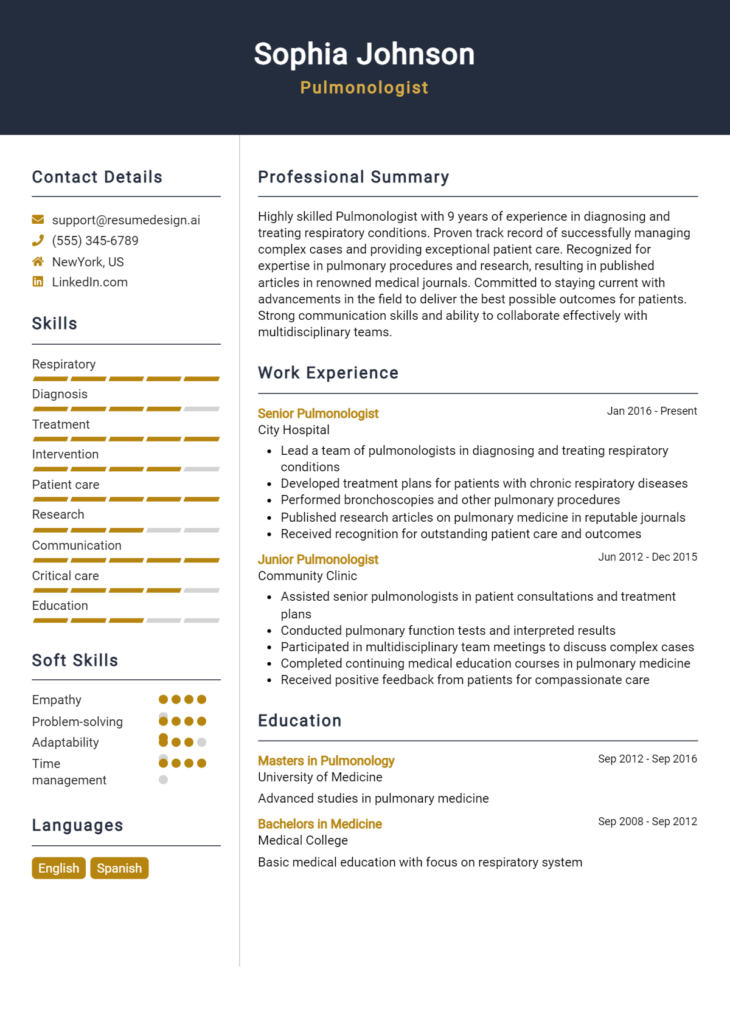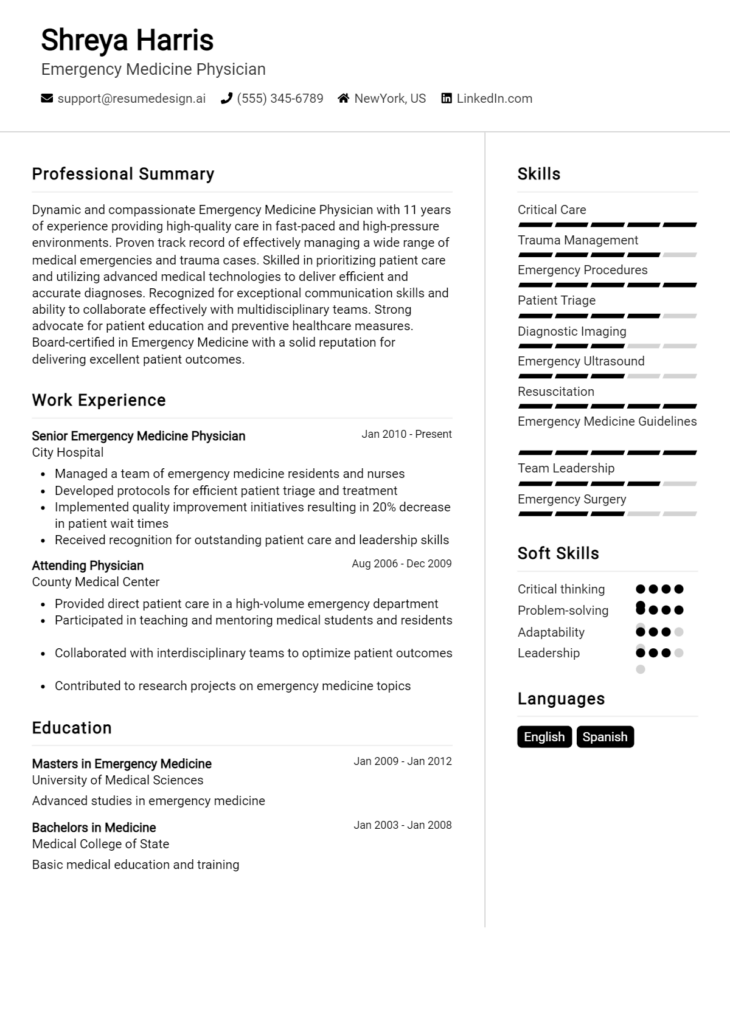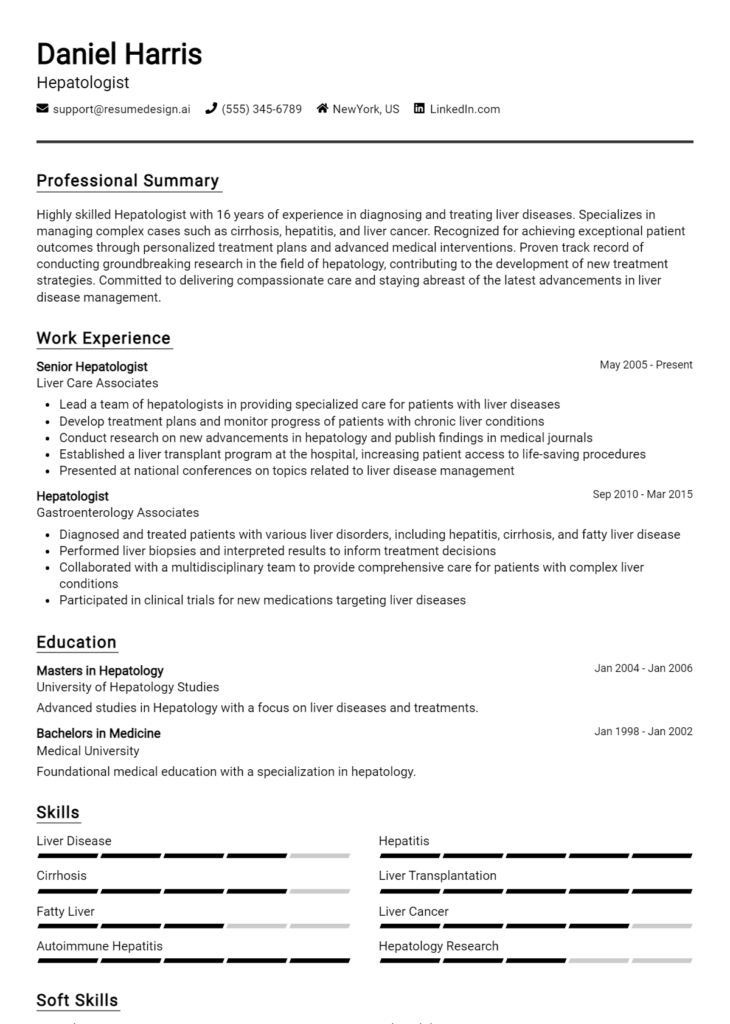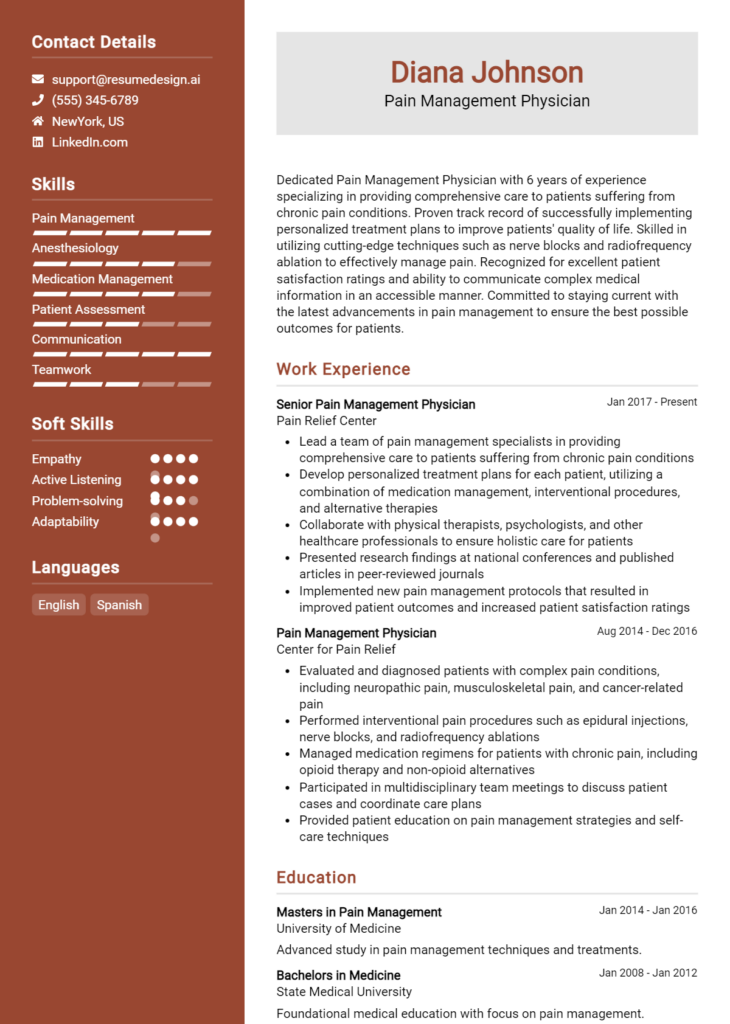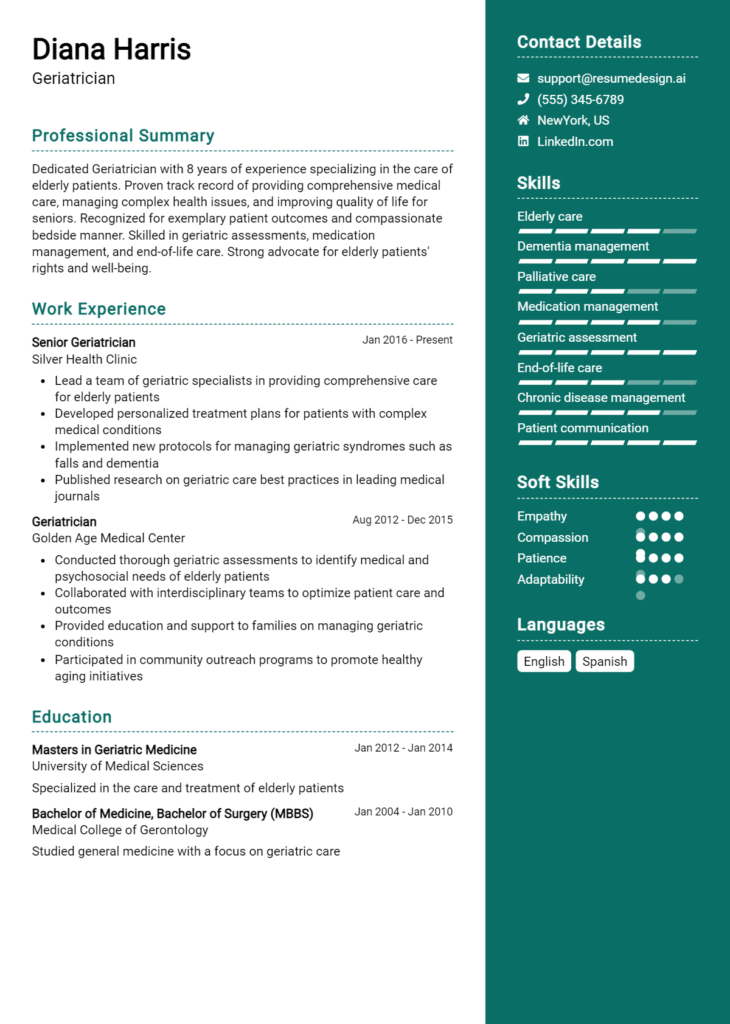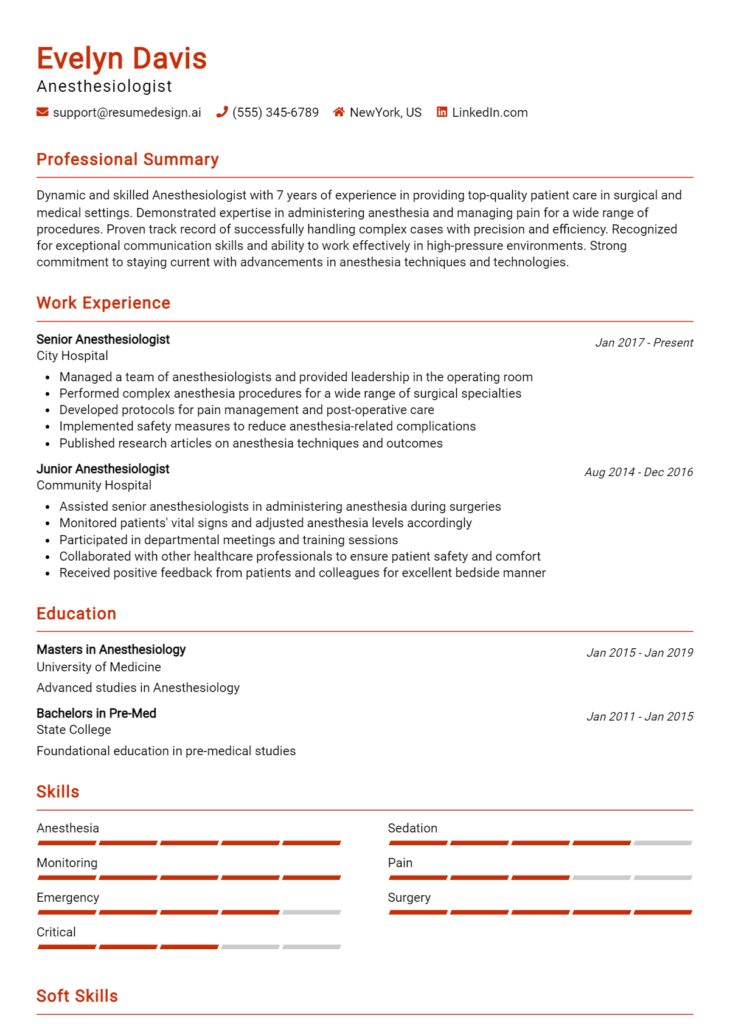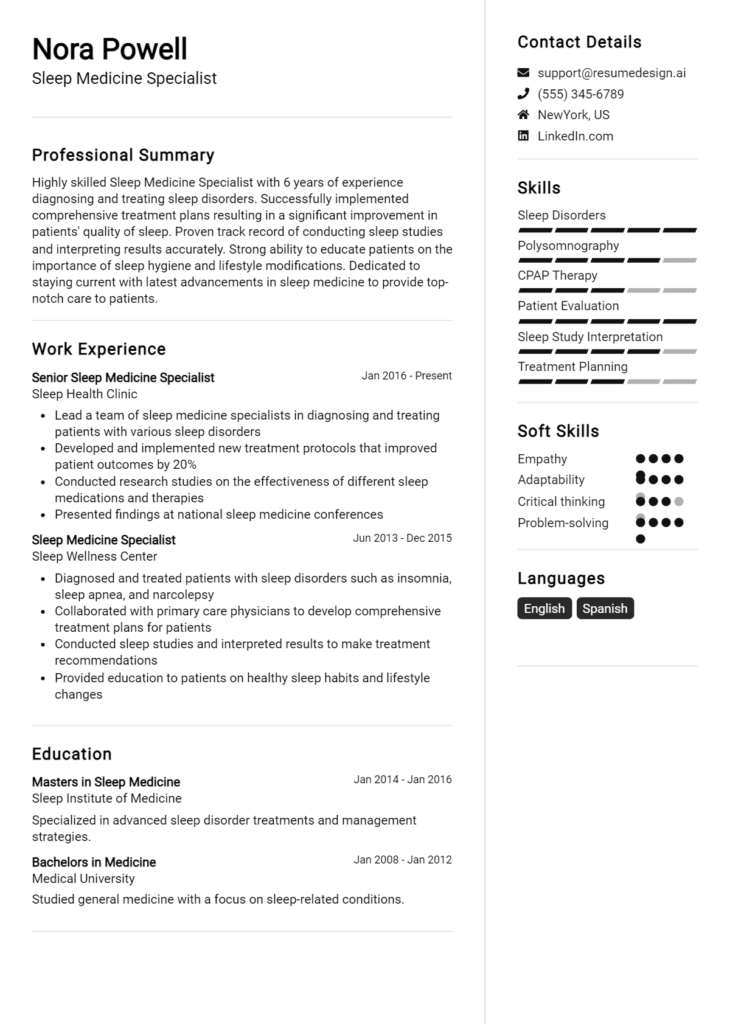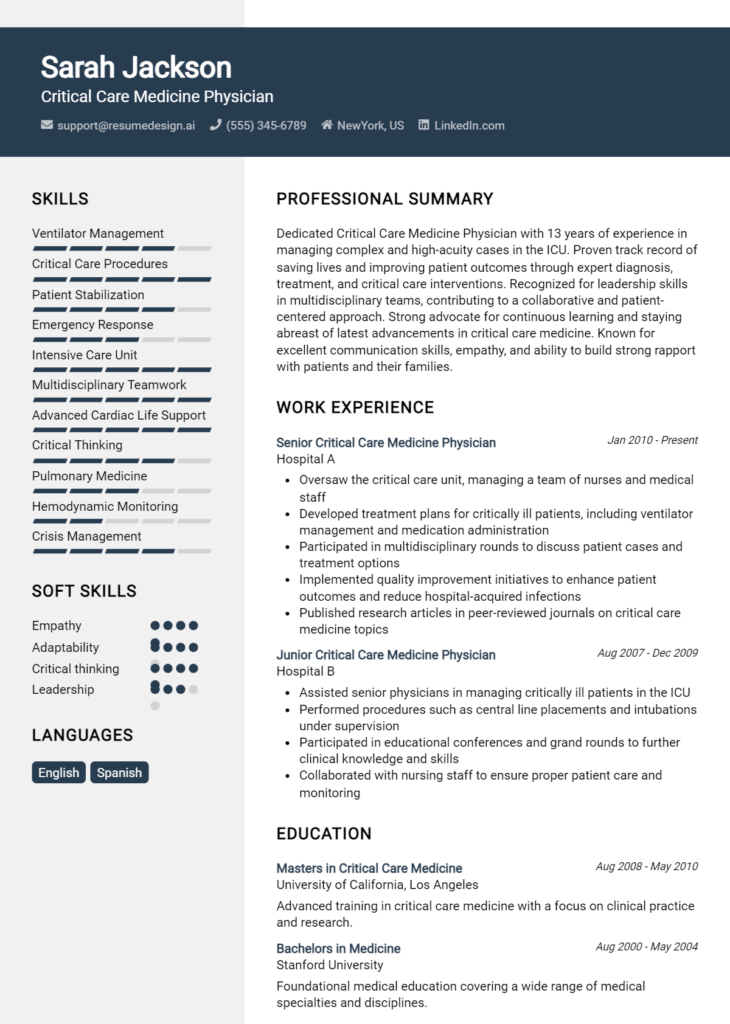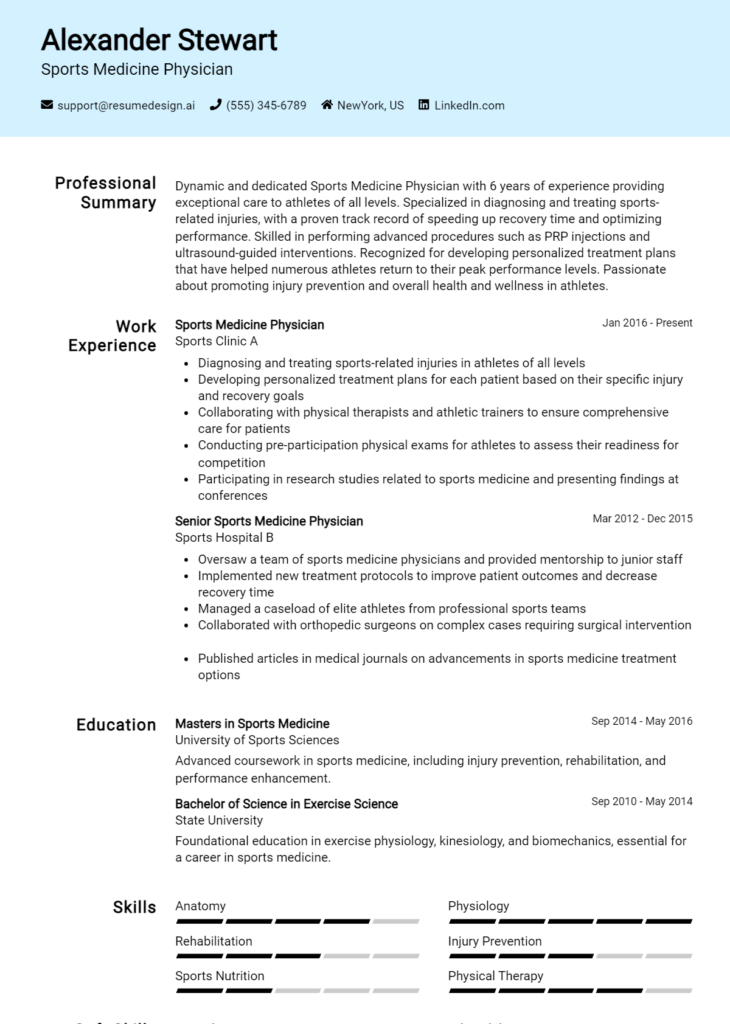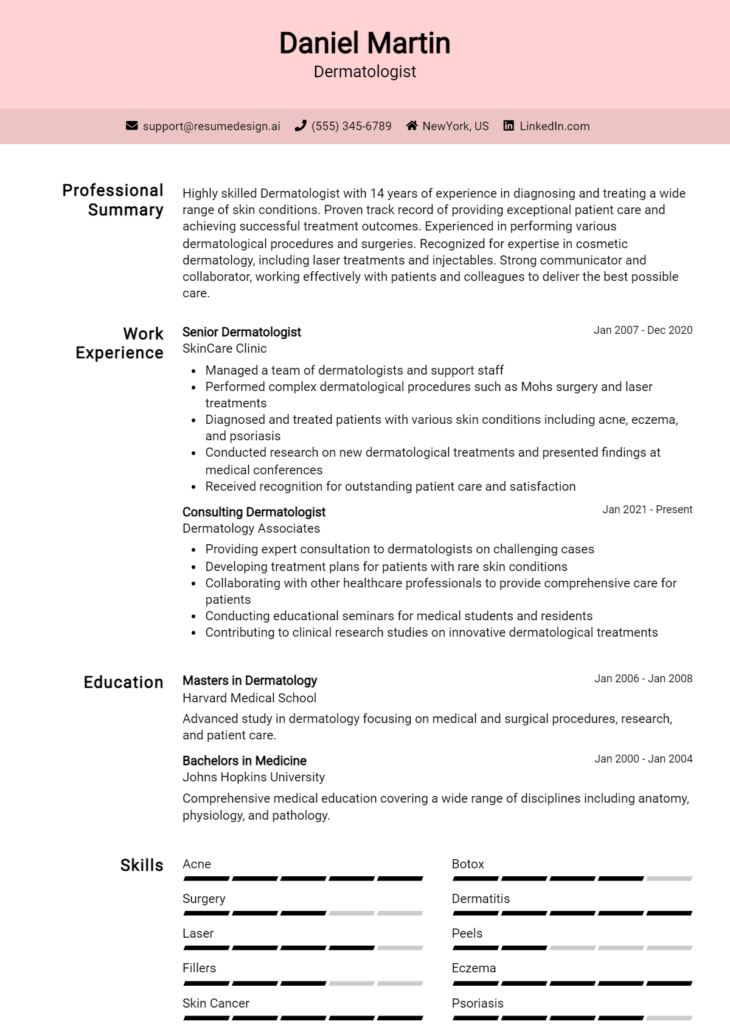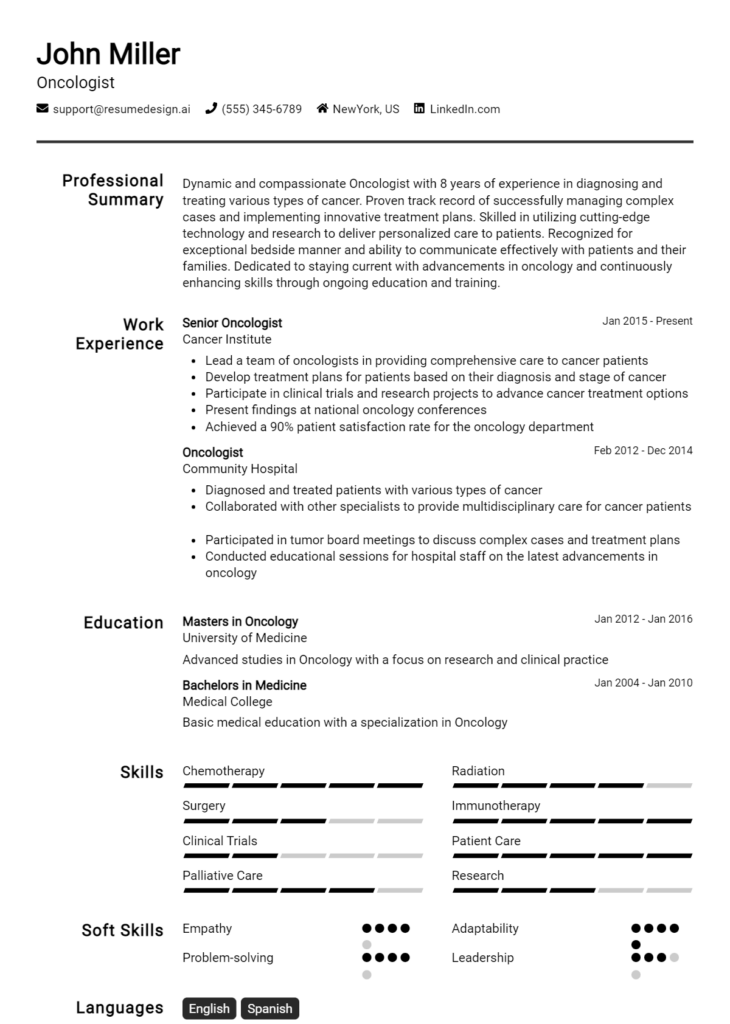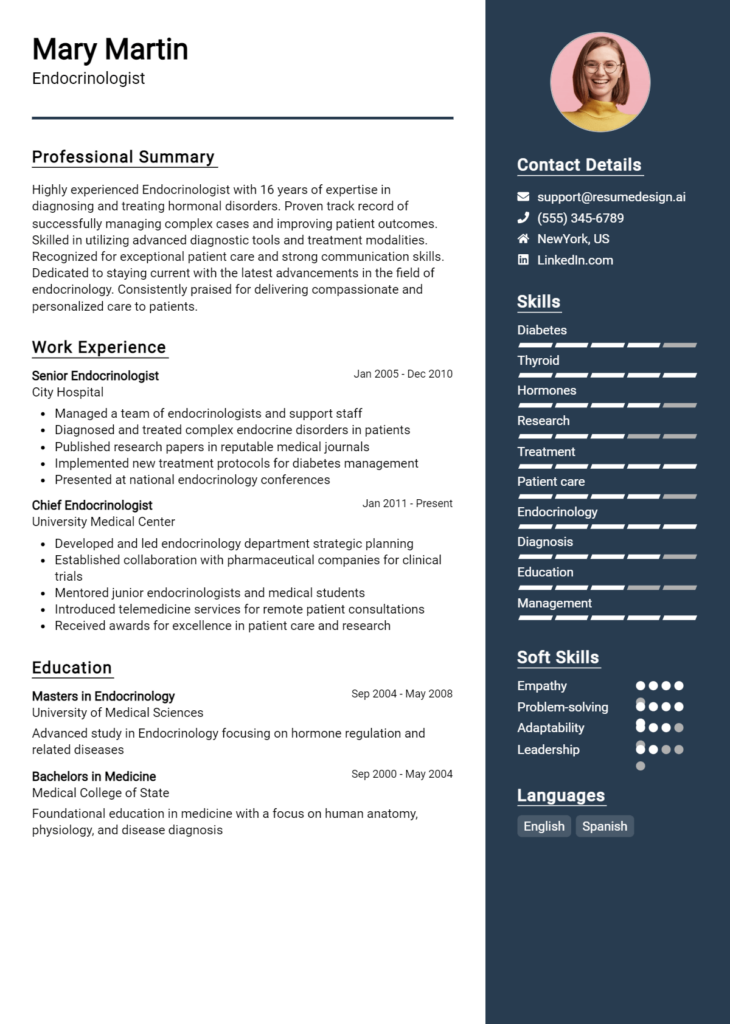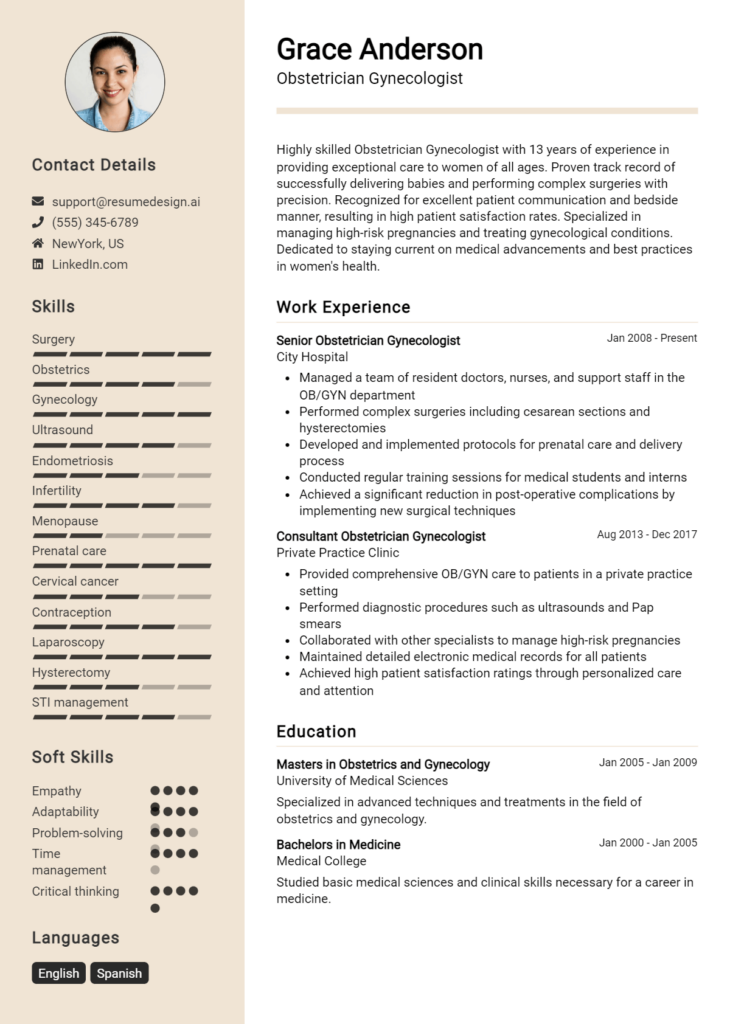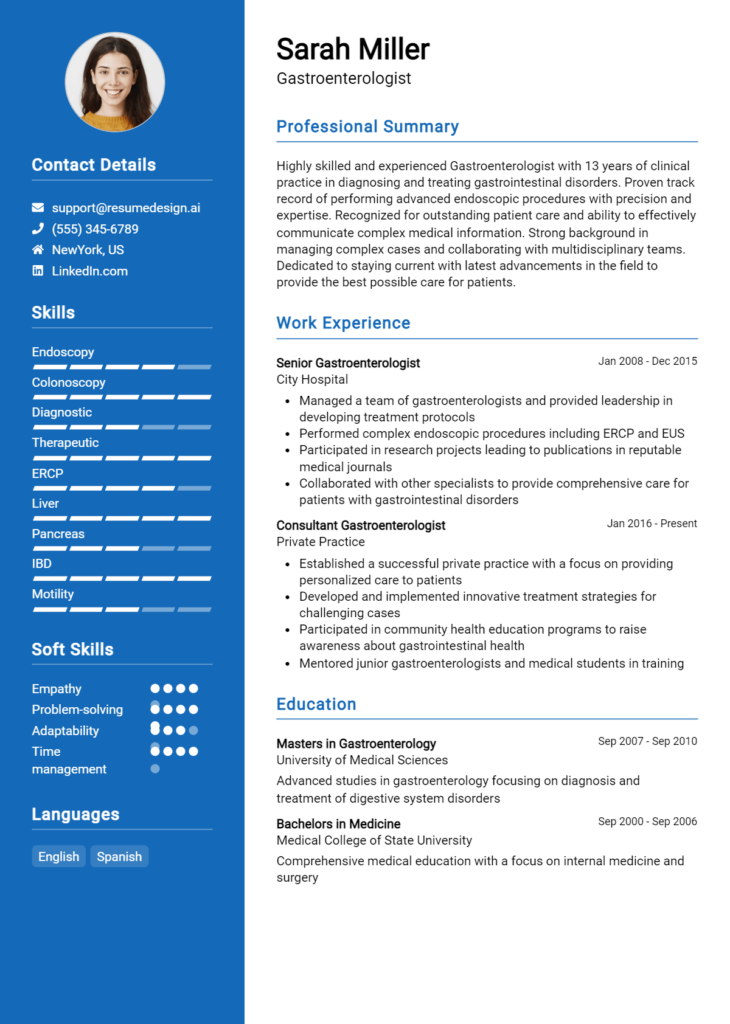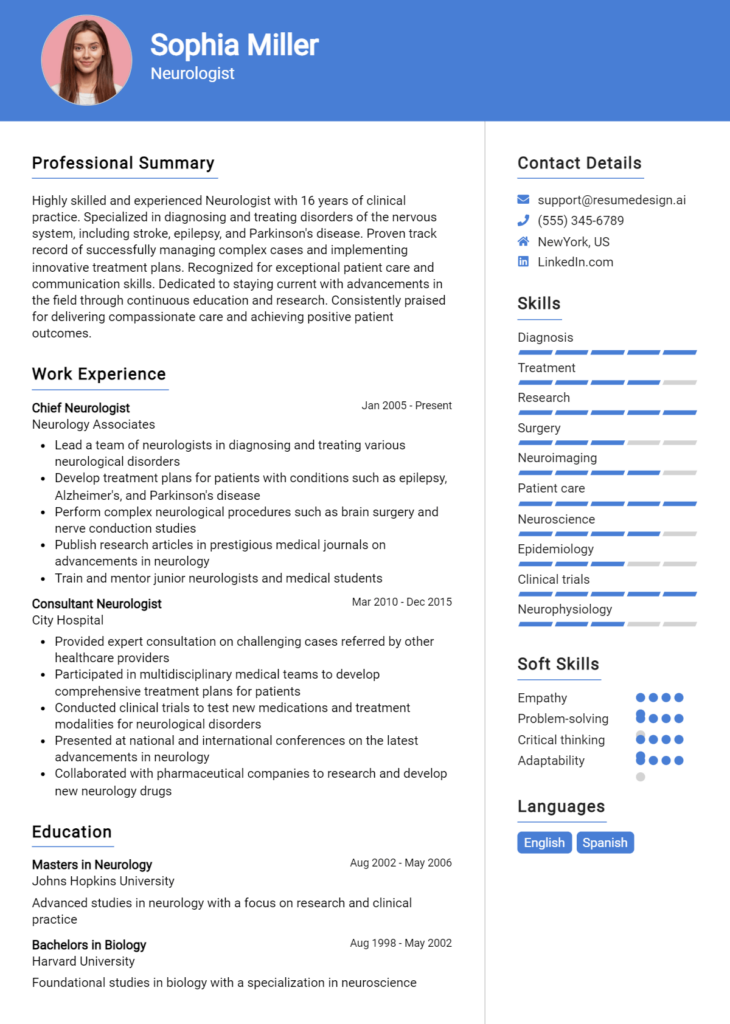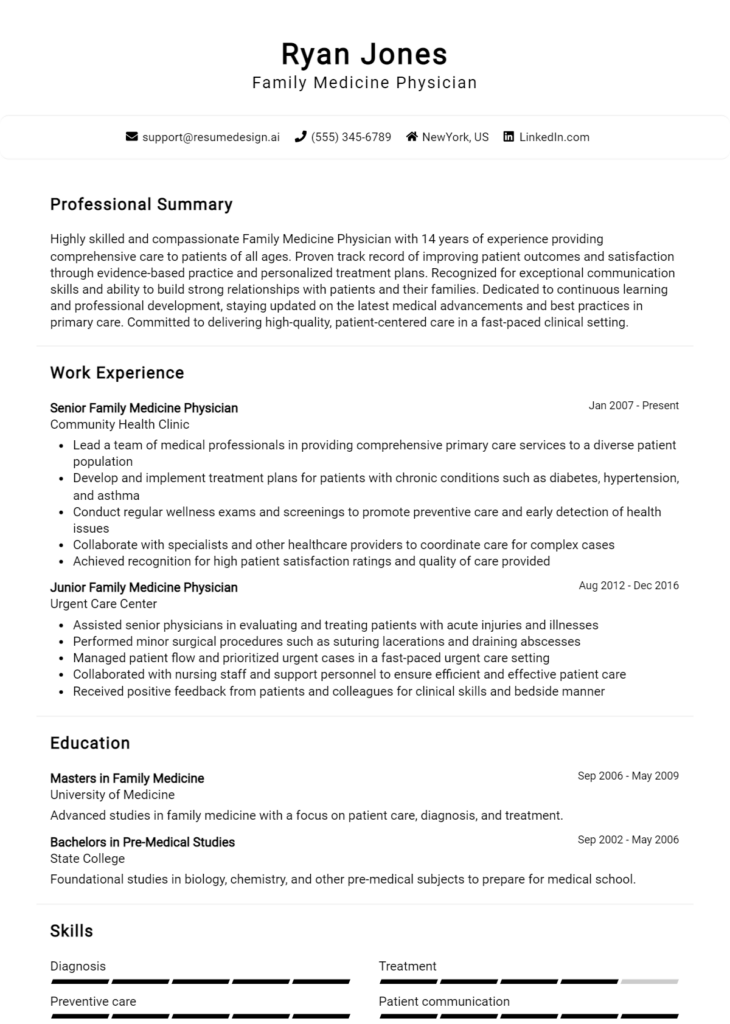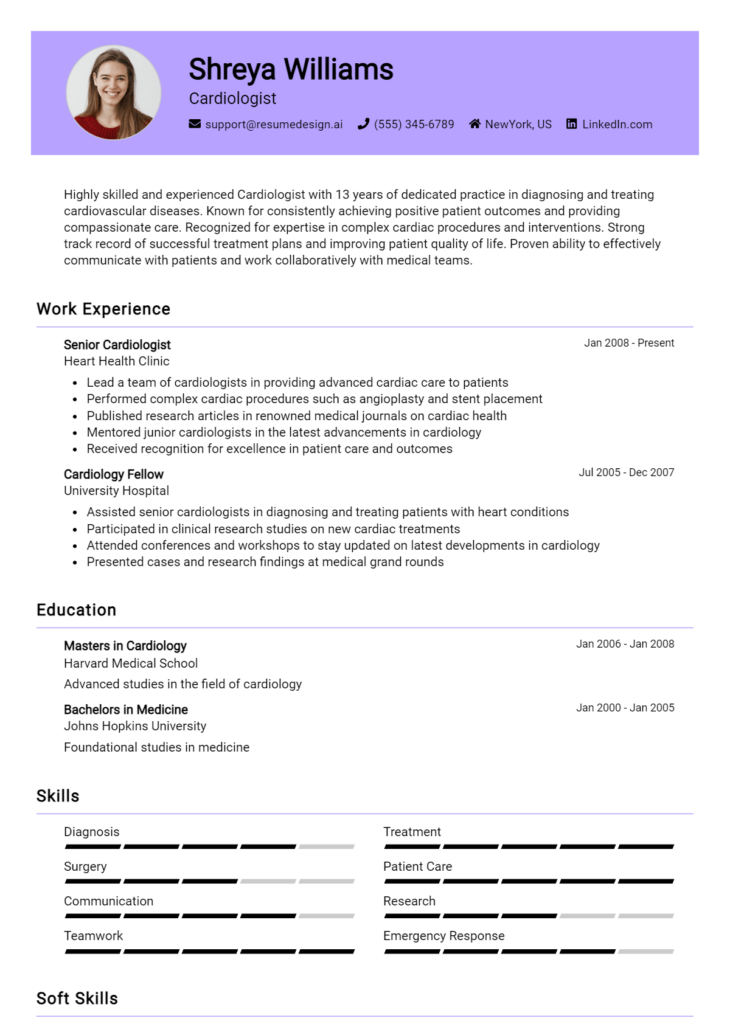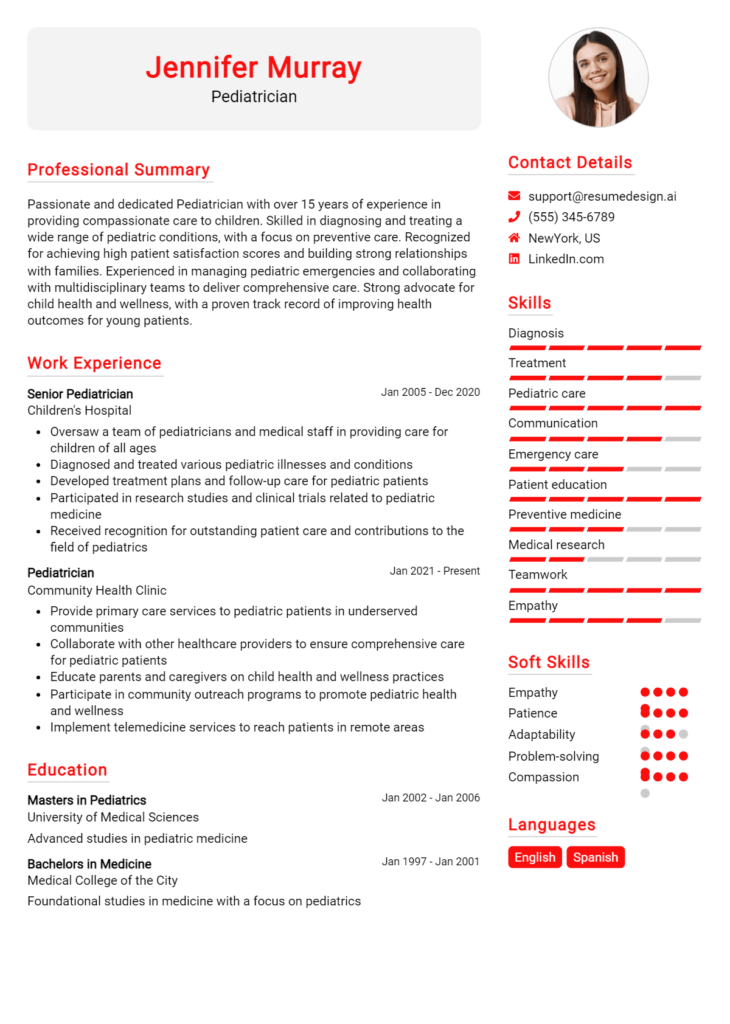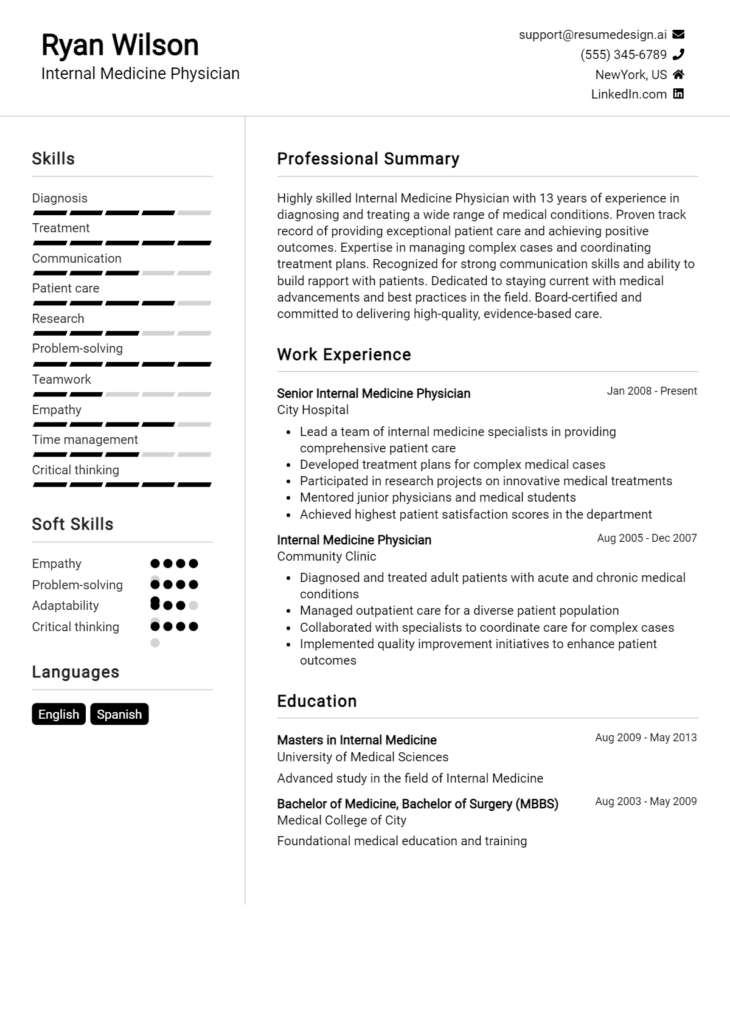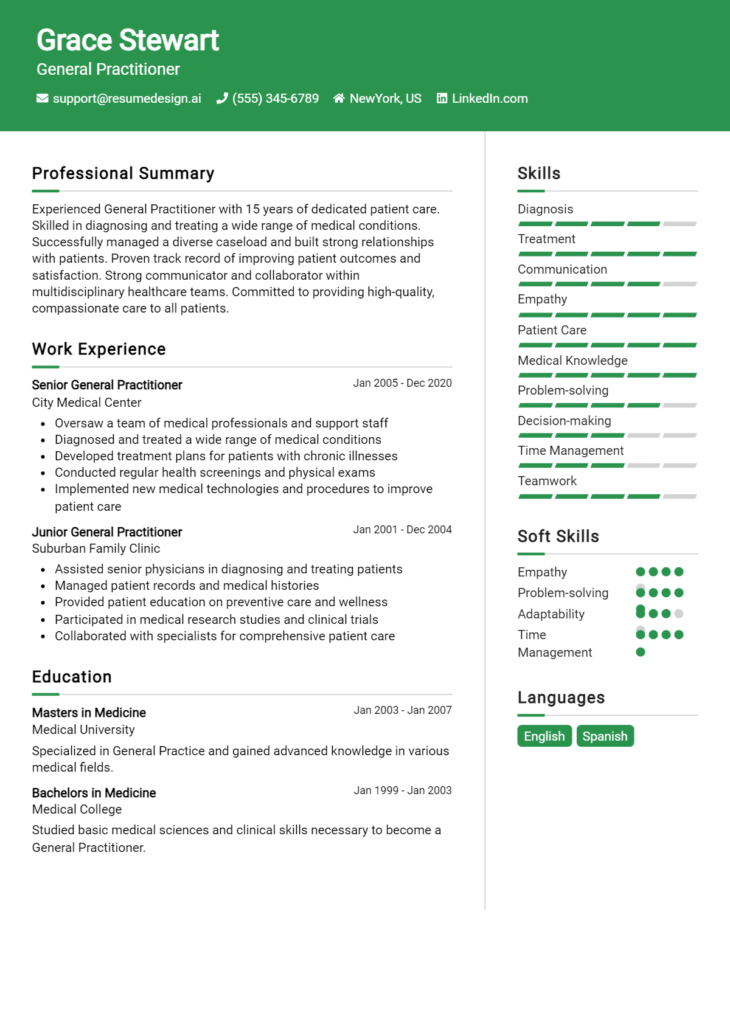Otolaryngologist Core Responsibilities
An Otolaryngologist, or ENT specialist, plays a crucial role in diagnosing and treating disorders related to the ear, nose, and throat. Key responsibilities include performing surgical procedures, conducting evaluations, and collaborating with various healthcare professionals to ensure comprehensive patient care. Essential skills encompass technical proficiency, operational efficiency, and strong problem-solving abilities, all of which contribute to enhancing the organization’s healthcare outcomes. A well-structured resume can effectively showcase these qualifications, highlighting the candidate’s capacity to bridge multiple medical disciplines.
Common Responsibilities Listed on Otolaryngologist Resume
- Perform diagnostic tests and evaluations for ear, nose, and throat conditions.
- Conduct surgical procedures, including tonsillectomies and sinus surgeries.
- Develop and implement individualized treatment plans for patients.
- Collaborate with other healthcare professionals for integrated patient care.
- Monitor patient progress and adjust treatment as necessary.
- Educate patients and families about conditions and treatment options.
- Maintain accurate patient records and documentation.
- Stay updated on advancements in otolaryngology and related fields.
- Participate in research and clinical trials to improve patient outcomes.
- Provide emergency care for acute ENT conditions.
- Advise on preventive measures and health promotion.
- Supervise and train medical staff and residents in ENT practices.
High-Level Resume Tips for Otolaryngologist Professionals
A well-crafted resume is crucial for Otolaryngologist professionals, as it often serves as the first impression they make on potential employers. In a competitive healthcare landscape, your resume must effectively showcase your skills, experiences, and achievements to stand out among other candidates. A strong resume not only highlights your qualifications but also communicates your passion for the field and your commitment to patient care. This guide will provide practical and actionable resume tips specifically tailored for Otolaryngologist professionals, ensuring your application leaves a lasting impact.
Top Resume Tips for Otolaryngologist Professionals
- Tailor your resume to match the specific job description, emphasizing relevant experience and skills that align with the role.
- Highlight your medical education, including any fellowships or specialized training in otolaryngology.
- Quantify your achievements with specific metrics, such as the number of successful surgeries performed or patient satisfaction scores.
- Showcase your proficiency in advanced technology and techniques related to otolaryngology, such as endoscopic procedures or minimally invasive surgeries.
- Include any research contributions or publications in medical journals that pertain to otolaryngology.
- Demonstrate your understanding of patient care by detailing your experience in managing diverse patient populations and complex cases.
- Highlight any leadership roles or committee memberships within professional organizations related to otolaryngology.
- Incorporate keywords from the job posting to ensure your resume passes through applicant tracking systems (ATS).
- Keep your resume concise and focused, ideally one to two pages, with clear sections for education, experience, and skills.
By implementing these tips, Otolaryngologist professionals can significantly enhance their resumes to better reflect their qualifications and unique contributions to the field. A well-optimized resume increases the chances of catching the eye of hiring managers and ultimately landing a desirable position in the competitive world of otolaryngology.
Why Resume Headlines & Titles are Important for Otolaryngologist
In the competitive field of otolaryngology, a well-crafted resume headline or title serves as the first impression a hiring manager receives. It plays a crucial role in summarizing a candidate's key qualifications and expertise in a concise manner. A strong headline can immediately grab the attention of hiring managers by encapsulating the candidate’s professional identity and unique selling points in one impactful phrase. This snapshot not only highlights the relevance of the candidate’s skills to the position being applied for but also sets the tone for the rest of the resume. Therefore, crafting a headline that is concise, relevant, and directly related to the job is essential for standing out in the job market.
Best Practices for Crafting Resume Headlines for Otolaryngologist
- Keep it concise – Aim for a headline that is no longer than one or two lines.
- Make it role-specific – Tailor your headline to align with the specific otolaryngologist position you are applying for.
- Highlight key qualifications – Include essential skills or certifications that demonstrate your expertise.
- Use impactful language – Choose words that convey confidence and professionalism.
- Avoid jargon – Use clear and accessible language that can be understood by all hiring managers.
- Incorporate numbers or metrics – If applicable, mention years of experience or notable achievements to add credibility.
- Be authentic – Ensure that your headline reflects your true skills and experiences.
- Review and revise – Continuously refine your headline based on feedback and evolving career goals.
Example Resume Headlines for Otolaryngologist
Strong Resume Headlines
Board-Certified Otolaryngologist with 10+ Years of Surgical Expertise
Compassionate ENT Specialist Committed to Patient-Centered Care
Otolaryngology Expert with Proven Track Record in Advanced Sinus Surgery
Innovative Otolaryngologist Specializing in Pediatric Ear Disorders
Weak Resume Headlines
Doctor Looking for a Job
Experienced Professional Seeking Opportunities
The strong headlines are effective because they clearly communicate the candidate's specialized skills and years of experience, instantly conveying their suitability for the otolaryngologist role. They use specific terminology that resonates with the hiring manager’s expectations and highlight relevant achievements. In contrast, the weak headlines fail to impress due to their vague and generic nature, lacking any meaningful detail that would capture a hiring manager’s interest. This lack of specificity diminishes the candidate's appeal and makes it difficult for them to stand out in a competitive job market.
Writing an Exceptional Otolaryngologist Resume Summary
A well-crafted resume summary is crucial for an Otolaryngologist as it serves as the first impression for hiring managers, providing a quick overview of the candidate's qualifications. This succinct section should highlight key skills, relevant experience, and notable accomplishments that align with the specific demands of the role. A strong summary not only captures attention but also encourages further reading by presenting an impactful narrative that is tailored to the job. In a competitive field, where expertise in ear, nose, and throat (ENT) conditions is vital, an effective summary can set the stage for a successful application.
Best Practices for Writing a Otolaryngologist Resume Summary
- Quantify achievements whenever possible to demonstrate results (e.g., "successfully treated over 500 patients").
- Highlight specific skills relevant to otolaryngology, such as surgical techniques, diagnostic abilities, and patient management.
- Tailor the summary to match the job description, using keywords and phrases that reflect the employer's needs.
- Keep it concise, ideally within 2-3 sentences, to maintain the reader's attention.
- Use action verbs to convey a sense of proactivity and effectiveness (e.g., "developed," "implemented," "managed").
- Include any relevant certifications or specialized training that enhances your qualifications.
- Showcase unique experiences or accomplishments that differentiate you from other candidates.
- Avoid jargon or overly technical language that may not be easily understood by all hiring managers.
Example Otolaryngologist Resume Summaries
Strong Resume Summaries
Compassionate Otolaryngologist with 10+ years of experience in diagnosing and treating complex ENT disorders. Successfully managed a patient caseload of over 600 annually, achieving a 95% patient satisfaction rate through comprehensive care and innovative treatment plans.
Board-Certified Otolaryngologist specializing in minimally invasive surgical techniques. Instrumental in reducing post-operative complications by 30% in a high-volume surgical center, while mentoring junior staff on best practices and patient care strategies.
Dedicated Otolaryngologist with advanced training in allergy management and sinus surgery. Led a team that developed a new treatment protocol, resulting in a 40% improvement in patient outcomes for chronic sinusitis within the first year of implementation.
Weak Resume Summaries
Experienced doctor with knowledge about ENT issues and treatments.
Otolaryngologist with several years of experience looking for a new opportunity in the healthcare field.
The strong resume summaries are effective because they provide specific, quantifiable achievements and demonstrate direct relevance to the Otolaryngologist role, showcasing the candidate's impact in their previous positions. In contrast, the weak summaries lack detail and specificity, failing to convey the candidate's unique qualifications or contributions, making them less compelling to hiring managers.
Work Experience Section for Otolaryngologist Resume
The work experience section of an Otolaryngologist resume is critical for demonstrating a candidate's qualifications and suitability for the role. This section not only highlights technical skills related to diagnosis and treatment of ear, nose, and throat disorders but also showcases the ability to manage teams effectively and deliver high-quality patient care. By quantifying achievements, such as improvements in patient outcomes or efficiency in procedures, candidates can provide concrete evidence of their contributions. Furthermore, aligning their experience with industry standards helps to reinforce their expertise and adaptability in a constantly evolving medical landscape.
Best Practices for Otolaryngologist Work Experience
- Detail specific technical skills relevant to otolaryngology, such as surgical techniques or diagnostic tools.
- Quantify achievements by including metrics like patient satisfaction ratings, surgery success rates, or operational efficiency improvements.
- Highlight leadership roles and team management experiences to demonstrate collaboration and mentorship capabilities.
- Include relevant certifications and training that enhance your qualifications in the field.
- Showcase participation in multidisciplinary teams to underline your ability to work with other healthcare professionals.
- Use action verbs to convey responsibility and initiative in your roles.
- Align your experience with current industry standards and best practices to illustrate relevance and expertise.
- Tailor your work experience to the specific job description to better match employer expectations.
Example Work Experiences for Otolaryngologist
Strong Experiences
- Led a surgical team performing over 200 successful tonsillectomies annually, achieving a 98% patient satisfaction rate.
- Implemented a new patient care protocol that reduced post-operative complications by 25% within the first year.
- Collaborated with an interdisciplinary team to develop a comprehensive treatment plan for patients with sleep apnea, resulting in a 30% increase in treatment adherence.
- Conducted research on the efficacy of minimally invasive techniques, which was published in a peer-reviewed journal, enhancing departmental credibility.
Weak Experiences
- Assisted in surgeries as needed.
- Worked with patients in the clinic.
- Participated in some team meetings.
- Involved in patient care activities.
The experiences listed as strong are considered exemplary because they clearly quantify achievements, demonstrate leadership and technical skills, and illustrate effective collaboration in a professional setting. Conversely, the weak experiences lack specificity, measurable outcomes, and do not highlight any significant contributions or responsibilities, making them less impactful in showcasing a candidate's qualifications.
Education and Certifications Section for Otolaryngologist Resume
The education and certifications section of an Otolaryngologist's resume is crucial in establishing the candidate's academic qualifications, specialized training, and commitment to ongoing professional development. This section serves to highlight not only the foundational knowledge acquired through formal education but also any industry-recognized certifications that validate the candidate's expertise in the field. By providing detailed information on relevant coursework, specialized training, and certifications, candidates can significantly enhance their credibility and demonstrate their alignment with the specific requirements of the job role.
Best Practices for Otolaryngologist Education and Certifications
- Include relevant degrees such as Doctor of Medicine (MD) or Doctor of Osteopathic Medicine (DO) prominently.
- List board certifications, such as those from the American Board of Otolaryngology, to validate expertise.
- Highlight any specialized training or fellowships completed in areas like pediatric otolaryngology or head and neck surgery.
- Detail relevant coursework or clinical rotations that specifically pertain to otolaryngology.
- Update this section regularly to reflect any new certifications or educational achievements.
- Organize the information chronologically, starting with the most recent qualifications to showcase continuous learning.
- Provide context for certifications by including the year obtained and any re-certification requirements met.
- Avoid including irrelevant or outdated qualifications that do not pertain to the field of otolaryngology.
Example Education and Certifications for Otolaryngologist
Strong Examples
- Doctor of Medicine (MD), Harvard Medical School, 2015
- Board Certified in Otolaryngology, American Board of Otolaryngology, 2017
- Fellowship in Pediatric Otolaryngology, Johns Hopkins Hospital, 2018
- Completed Advanced Head and Neck Surgery Course, 2021
Weak Examples
- Bachelor of Arts in History, University of California, 2010
- Certification in Basic Life Support (BLS), expired 2020
- Completed a short course on Medical Billing, 2019
- High School Diploma, Springfield High School, 2006
The strong examples are considered robust because they directly relate to the skills and knowledge required for an Otolaryngologist, showcasing relevant medical degrees, board certifications, and specialized training that align with industry standards. In contrast, the weak examples reflect qualifications that are either irrelevant to the practice of otolaryngology or outdated, which do not contribute to the candidate's credibility in the field. It is essential to focus on qualifications that enhance the candidate's profile and demonstrate a commitment to the specialty.
Top Skills & Keywords for Otolaryngologist Resume
As an Otolaryngologist, also known as an ENT specialist, showcasing the right skills on your resume is crucial for standing out in a competitive job market. Your skills not only reflect your medical expertise but also demonstrate your ability to effectively communicate, empathize with patients, and work collaboratively with healthcare teams. By emphasizing both hard and soft skills, you can create a comprehensive picture of your qualifications, making it easier for potential employers to see your value. A well-crafted resume that highlights your skills can significantly impact your job search. For more information on essential skills, check out this skills resource.
Top Hard & Soft Skills for Otolaryngologist
Soft Skills
- Excellent communication
- Empathetic patient care
- Problem-solving abilities
- Team collaboration
- Attention to detail
- Time management
- Stress resilience
- Adaptability
- Critical thinking
- Leadership skills
Hard Skills
- Proficient in diagnostic procedures
- Surgical techniques specific to ENT
- Knowledge of audiology assessments
- Expertise in treating sinus disorders
- Familiarity with imaging techniques (e.g., CT scans, MRIs)
- Ability to perform endoscopic examinations
- Experience with hearing aids and implants
- Knowledge of pharmacology related to ENT treatments
- Proficient in patient assessment and diagnosis
- Understanding of allergy management and treatment
Incorporating these skills into your resume can enhance your work experience narrative, ultimately helping you secure a position that aligns with your professional goals.
Stand Out with a Winning Otolaryngologist Cover Letter
Dear [Hiring Manager's Name],
I am writing to express my interest in the Otolaryngologist position at [Hospital/Clinic Name] as advertised on [Job Board/Website]. With a comprehensive background in diagnosing and treating conditions related to the ear, nose, and throat, combined with my commitment to patient-centered care, I am excited about the opportunity to contribute my expertise to your esteemed team. My experience in both clinical and surgical settings has equipped me with the skills necessary to provide exceptional care and improve patient outcomes.
Throughout my [number] years of practice, I have developed a strong foundation in the latest otolaryngological procedures and treatments. My training at [Medical School/Residency Program] provided me with invaluable hands-on experience, allowing me to hone my skills in areas such as endoscopic sinus surgery, thyroid surgeries, and pediatric otolaryngology. Additionally, I am passionate about staying updated with advancements in the field, regularly attending conferences and participating in continuing medical education to ensure that my patients receive the best and most current treatment options available.
At [Previous Employer/Practice], I successfully managed a diverse patient population, fostering strong relationships built on trust and empathy. I believe in taking a holistic approach to patient care that encompasses not just the physical aspects of treatment but also the emotional and psychological support necessary for healing. My collaborative spirit and excellent communication skills have allowed me to work effectively with multidisciplinary teams, ensuring comprehensive care for all patients. I am particularly drawn to [Hospital/Clinic Name] because of its reputation for innovation and excellence in patient care, and I would be honored to contribute to your mission.
Thank you for considering my application. I look forward to the opportunity to discuss how my background and passion for otolaryngology align with the goals of [Hospital/Clinic Name]. I am eager to bring my dedication to patient care and my surgical expertise to your team and help make a positive impact on the lives of those we serve.
Sincerely,
[Your Name]
[Your Contact Information]
Common Mistakes to Avoid in a Otolaryngologist Resume
When applying for a position as an otolaryngologist, it is crucial to present a polished and professional resume. Unfortunately, many candidates make common mistakes that can hinder their chances of securing an interview. Understanding and avoiding these pitfalls can significantly enhance the effectiveness of your resume. Below are some frequent errors to watch out for:
Lack of Specificity: Generalizing your experience or skills can make your resume blend in with others. Be specific about your clinical expertise, procedures performed, and conditions treated.
Ignoring Keywords: Failing to include relevant keywords from the job description can result in your resume being overlooked by applicant tracking systems (ATS). Tailor your resume for each application by integrating important terms.
Overloading with Jargon: While technical knowledge is essential in medicine, excessive medical jargon can alienate non-medical personnel involved in the hiring process. Strike a balance between professionalism and clarity.
Neglecting Continuing Education: Not highlighting ongoing education or certifications can give the impression that you are not committed to staying current in your field. List relevant courses, workshops, or certifications.
Inconsistent Formatting: A disorganized or inconsistent resume layout can distract from your qualifications. Ensure uniformity in fonts, bullet points, and spacing for a professional appearance.
Omitting Soft Skills: Focusing solely on technical skills may overlook the importance of interpersonal abilities, such as communication and patient care. Include soft skills that demonstrate your well-rounded capabilities.
Failure to Quantify Achievements: Not providing measurable outcomes or achievements can weaken your claims. Use numbers or specific examples to showcase the impact of your work, such as patient satisfaction scores or successful treatment outcomes.
Too Much Personal Information: Including excessive personal details, such as age or marital status, can be unnecessary and may even lead to bias. Stick to relevant professional information to maintain focus.
By steering clear of these common mistakes, you can create a compelling otolaryngologist resume that stands out to potential employers.
Conclusion
As an Otolaryngologist, your role encompasses the diagnosis and treatment of conditions related to the ear, nose, throat, and related structures of the head and neck. This specialty requires extensive medical knowledge, technical skills, and the ability to communicate effectively with patients. It is essential to stay updated with the latest advancements in ENT medicine to provide optimal care for your patients.
In addition to clinical skills, a well-crafted resume is crucial for showcasing your qualifications and experiences to potential employers. Tailoring your resume to highlight your specific skills, certifications, and achievements can significantly enhance your job prospects.
To ensure your resume stands out, consider using professional tools designed to help you create a polished and effective document. Explore a variety of resume templates that can provide a strong foundation for your application. If you prefer a more customized approach, utilize the resume builder to craft a unique resume that reflects your professional journey. Additionally, reviewing resume examples can offer inspiration and guidance on formatting and content. Don’t forget the importance of a compelling cover letter; you can find cover letter templates to help you effectively introduce yourself to prospective employers.
Now is the time to revisit and refine your Otolaryngologist resume. Take advantage of these resources to enhance your application and make a strong impression in your job search.

